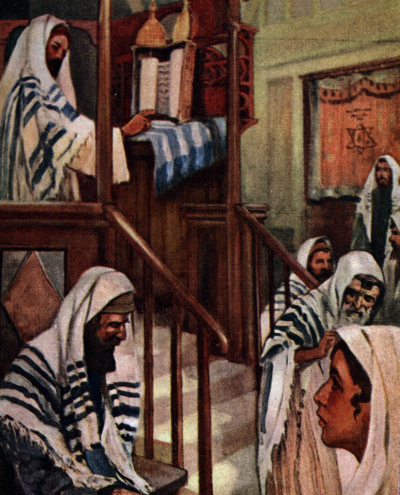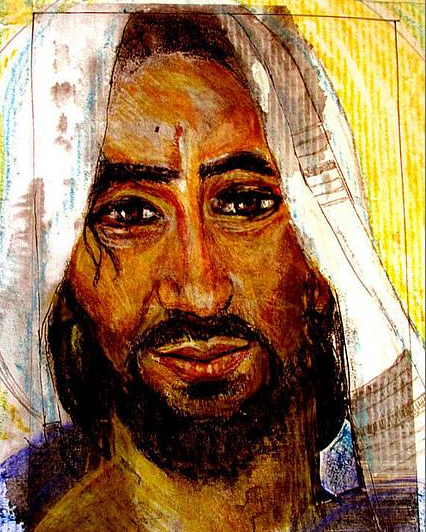Christian Art | Jesus Calls Saint Matthew
Matthew 9: 9-13 – Week 13 Ordinary Time, Friday (King James Audio Bible KJV, Spoken Word)
9 ¶ And as Jesus passed forth from thence, he saw a man, named Matthew, sitting at the receipt of custom: and he saith unto him, Follow me. And he arose, and followed him.
10 ¶ And it came to pass, as Jesus sat at meat in the house, behold, many publicans and sinners came and sat down with him and his disciples.
11 And when the Pharisees saw it, they said unto his disciples, Why eateth your Master with publicans and sinners?
12 But when Jesus heard that, he said unto them, They that be whole need not a physician, but they that are sick.
13 But go ye and learn what that meaneth, I will have mercy, and not sacrifice: for I am not come to call the righteous, but sinners to repentance.
In the Sermon on the Mount, Jesus preached a message of love and acceptance. He called everyone to a new way of being, which would be true to God’s will. As the narrative account continues from chapter eight through nine, we see Jesus putting into practice the lessons he has taught. Jesus accepts lepers, foreigners, women, the sick, the possessed, paralytics, the unclean, and now a tax collector.
Matthew would have been a sinner, an unclean person, to the Jewish people, most notably the Pharisees. Matthew is the agent of the occupying power and a sign of Jewish subjection, as of the grotesque embarrassment of the historical failure to maintain a nation state. In other Gospels, he is called Levi. The name Matthew has a beautiful meaning: gift of God, or given by God. He becomes in Jesus’ presence a gift to the community: if Matthew the publican can find redemption, there can surely be redemption for all.
Like the fishermen before him, Matthew leaves everything he has to follow Jesus. He gives up his job, his source of wealth. It is a symbolic moment. Matthew’s response to Jesus’ call is instant and complete. There is no sense of putting things off, as is the case elsewhere in the Gospels with the man who must go bid goodbye to his family and friends. There is a breaking away from the old life to embrace the new.
The message of acceptance and inclusivity continues as many sinners and publicans, i.e. tax collectors, come to dine at table with Jesus. Matthew may have been intending his original audience to understand that old divisions are absolved in Jesus, and the laws of cleanliness which forbade Jews from eating with others no longer applied, since all in the communities were Christian, both Gentile and Jew. The Christian Jews are called in these verses to give up their isolation and live in love and peace with all.
In response to the Pharisees’ question, Jesus tells us that he is come to call sinners – to repentance, and to everlasting life. We are reminded that we are all sinners, indeed that we cannot truly be scandalized by the sins of others, since the capacity for even the vilest of sins is there without the help of God’s grace. The self-righteous do indeed shut the door on God, but those who honestly present themselves as they truly are, to God in all humility, have a place in heaven.

Concluding Prayer
Lord God,
you hold out the light of your Word
to those who do not know you.
Strengthen in our hearts the faith you have given us,
so that no trials may quench the fire
your Spirit has kindled within us.
We make our prayer through our Lord.
King James Audio Bible | Endnotes
Jesus Is Come To Call Sinners
Matthew 9:9-13 tells the story of Jesus calling Matthew, a tax collector, i.e. a publican, to follow him. The scene takes place in Capernaum, where Jesus is preaching to a crowd. Matthew, sitting at his tax booth, is approached by Jesus, who simply says: ‘Follow me.’ Matthew immediately leaves his work behind and follows Jesus.
This encounter between Jesus and Matthew is significant because tax collectors in the time of Jesus were considered outcasts and sinners by the Jewish community. They were seen as collaborators with the Roman Empire, and their wealth often came from overcharging their fellow Jews. In calling Matthew, Jesus is demonstrating that his message of love and forgiveness is for everyone, even those who are considered the lowest of the low.
The Pharisees, who were among the religious leaders of the time, were scandalized by Jesus’ association with sinners. They questioned Jesus’ disciples, asking why their teacher would eat with tax collectors and other sinners. In response, Jesus says: ‘They that be whole need not a physician, but they that are sick. But go ye and learn what that meaneth, I will have mercy, and not sacrifice: for I am not come to call the righteous, but sinners to repentance.’ (Matthew 9:12-13)
This statement by Jesus is powerful and speaks to the heart of his mission on earth. Jesus came to save sinners, not to condemn them. Jesus’ message of love and forgiveness was not just for the righteous or the morally upstanding, but for all people, regardless of their past or current sins.
Throughout the Bible, we see examples of Jesus reaching out to sinners and offering them salvation. In Luke 19, Jesus calls Zacchaeus, another tax collector, down from a tree and invites himself to his home for dinner. This act of kindness and acceptance leads Zacchaeus to repent of his sins and give half of his possessions to the poor.
In John 8, we read the story of the woman caught in adultery. The Pharisees bring her before Jesus, hoping to trap him into breaking the law. Instead, Jesus writes in the sand and tells the men that anyone who is without sin among them should cast the first stone. Jesus forgives the woman and tells her to go and sin no more. This act of mercy and forgiveness is a powerful example of Jesus’ message of love and redemption.
Many Christians have written and spoken about Jesus’ message of love and forgiveness. In his book Mere Christianity, C.S. Lewis writes: ‘The Christian does not think God will love us because we are good, but that God will make us good because He loves us.’ This speaks to the heart of Jesus’ message. Jesus came to save sinners and to transform their lives through his love and grace.
In the Catholic Church, Pope Francis has spoken extensively about Jesus’ message of love and mercy. In his book The Name Of God Is Mercy, Pope Francis writes: ‘God is always waiting for us, He always understands us, He always forgives us.’ This message of forgiveness and understanding is at the core of Jesus’ teachings.
In Protestant traditions, many theologians have written about the concept of grace, which is the idea that salvation is a free gift from God, given to sinners who do not deserve it. In his book The Cost Of Discipleship, Dietrich Bonhoeffer writes: ‘Cheap grace is the grace we bestow on ourselves. Cheap grace is the preaching of forgiveness without requiring repentance… Costly grace is the gospel which must be sought again and again.’
The message of Jesus calling sinners to repentance is not just a historical event, but a message that still speaks to us today. In our modern world, where division and judgment seem to be the norm, the message of love and forgiveness is more important than ever.
In the words of Martin Luther King Jr.: ‘We must learn to live together as brothers or perish together as fools.’ The message of Jesus calling sinners to repentance is a powerful reminder that we are all sinners in need of God’s grace and mercy. It is a call to reach out to one another with love and compassion, to build bridges instead of walls, and to strive for a better world for all people.








